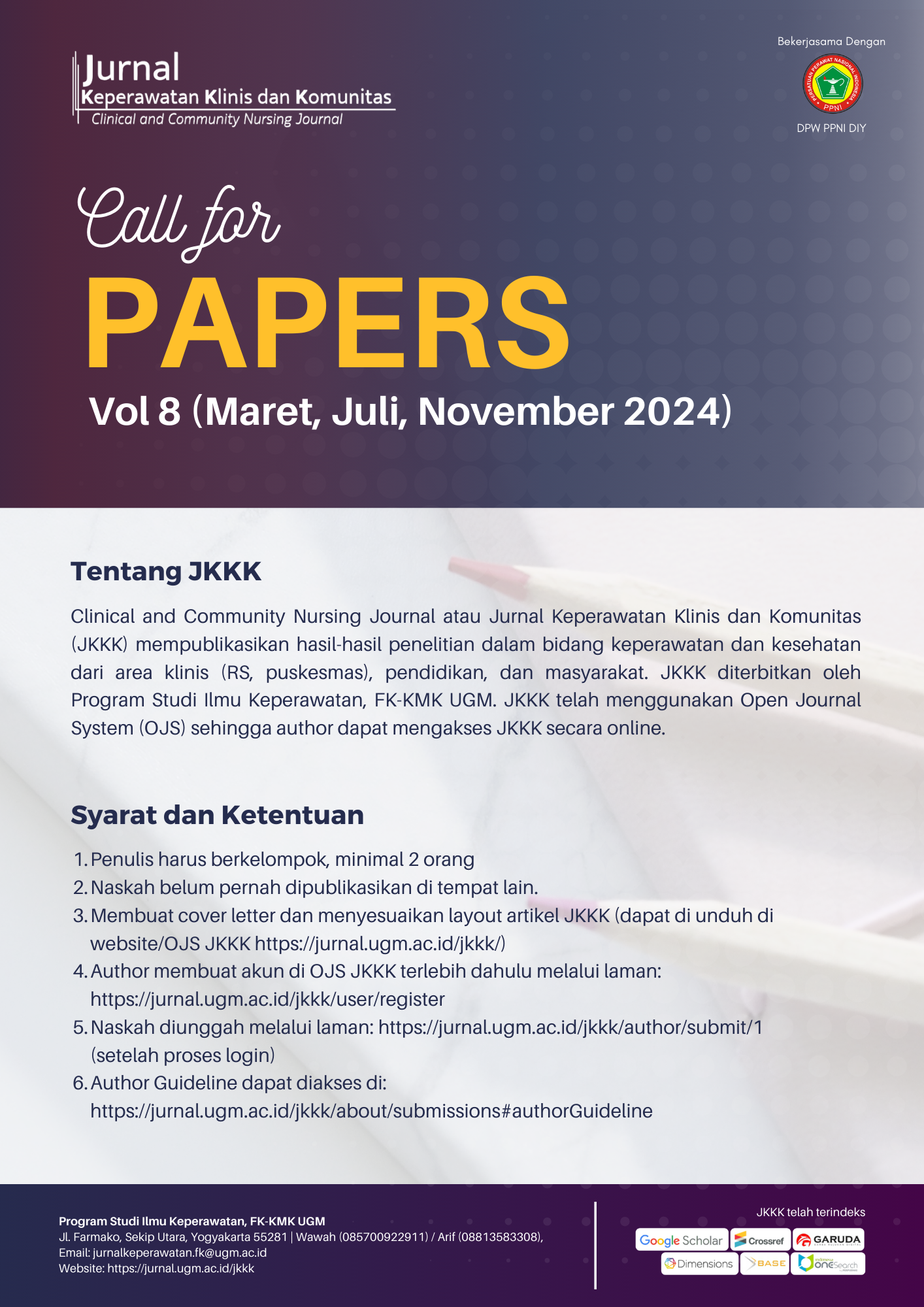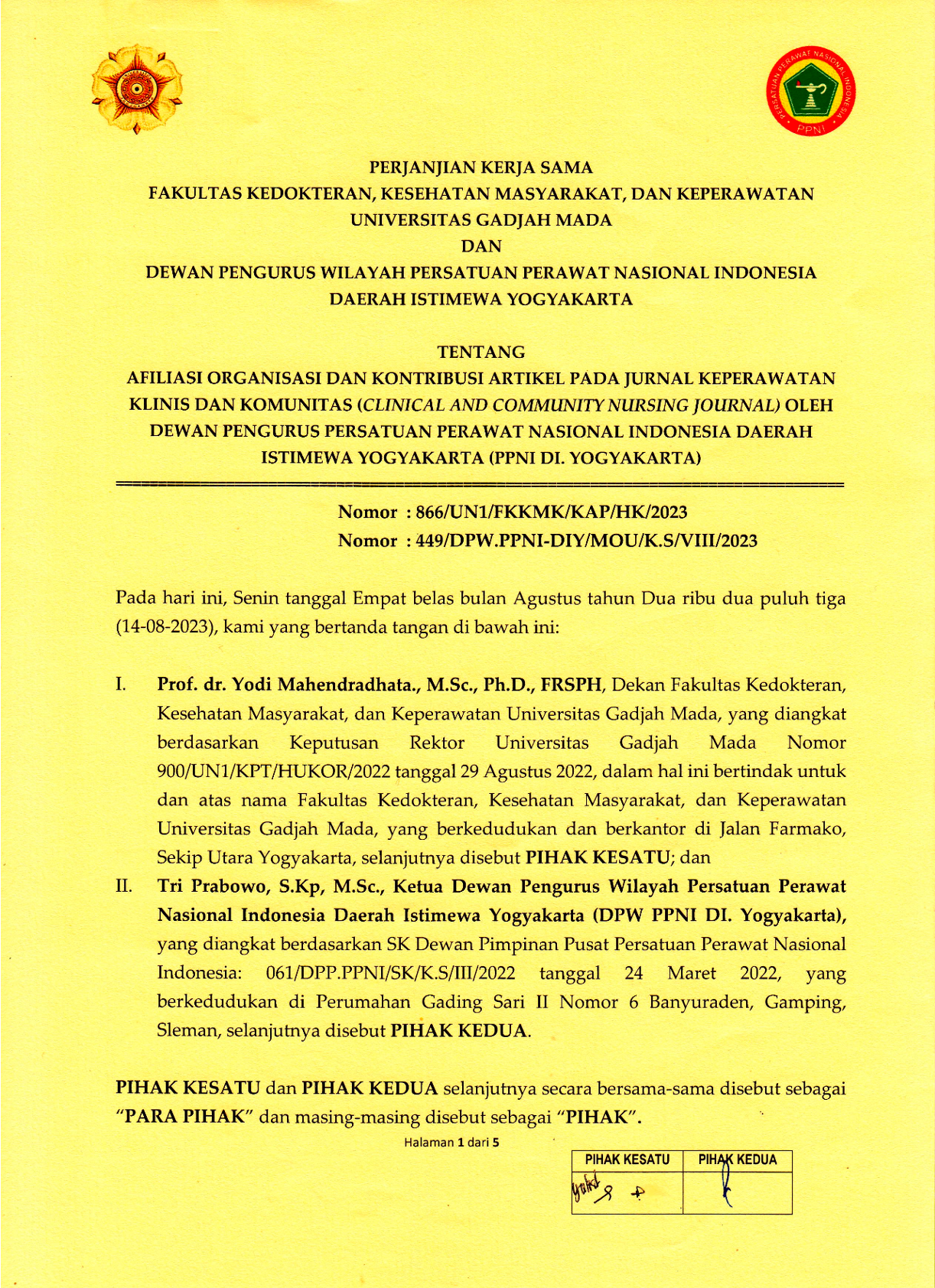Gambaran Tingkat Risiko Jatuh dan Penanganannya pada Pasien Jiwa di Rumah Sakit
Tiara Sas Dhewanti(1*), Intansari Nurjannah(2)
(1) Rumah Sakit Umum Pusat Dr. Sardjito, Yogyakarta
(2) Departemen Keperawatan Jiwa dan Komunitas, Fakultas Kedokteran, Kesehatan Masyarakat, dan Keperawatan, Universitas Gadjah Mada
(*) Corresponding Author
Abstract
Background: One of the concerns associated with patient safety is prevention of falls. Patients with mental disorders have a higher risk of falling compared to other patient age, diagnosis of depression, use of antipsychotics medication, and medical therapy management of Electro Convulsive Therapy.
Objective: This study was aimed to explore the description of risk for fall levels in the category of psychiatric patients and to identify risk for falls management of mental health patients based on Client Categorization System.
Method: A descriptive quantitative research with case study design was performed on 20 psychiatric patients and 4 nurses. The instruments used were Edmonson Fall Risk Assessment Tool (EFRAT) to identify the risk for falls on patients, and Client Categorization System (CCS) to categorize the psychiatric patients. The univariate analysis was used to accomplish the aim of the study.
Result: As much as 37,5% patients have risk for falls. The risk of falling level of psychiatric patients occurred mostly on respondents with crisis category (66,7%). No patients with health promotion category have risk for falls. The most activity done with the Nursing Intervention Classification (NIC) (environment modification is using safety equipment. Meanwhile, the most activities done on NIC fall prevention are preparing an appropriate lighting and collaborate with other medical team. Moreover collaboration with other medical team is also needed.
Conclusions: Risk for falls on patients with mental health disorders can be found on patients with these category: crisis, acute, and maintenance. Management of patients with mental disorders based in NIC are Fall Prevention and Environmental Modification.
ABSTRAK
Latar belakang: Pencegahan jatuh merupakan bagian dari keselamatan pasien. Pasien dengan gangguan jiwa mempunyai risiko jatuh lebih tinggi karena usia, diagnosis depresi, penggunaan obat anti psikotik, dan penatalaksanaan terapi medis electro convulsive therapy.
Tujuan: Mengetahui gambaran tingkat risiko jatuh dan manajemen penanganannya pada pasien gangguan jiwa beradasarkan Client Categorization System(CCS).
Metode: Penelitian ini adalah penelitian deskriptif kuantitatif dengan rancangan case study. Responden terdiri dari 20 pasien gangguan jiwa dan 4 perawat. Instrumen yang digunakan adalah Edmonson Fall Risk Assessment Tool (EFRAT) untuk mengkaji risiko jatuh pada pasien. Sementara, pengkategorian pasien jiwa dilakukan menggunakan instrumen Client Categorization System (CCS). Data hasil penelitian dianalisis menggunakan analisis univariat.
Hasil: Hasil penelitian didapatkan sebanyak 37,5% pasien memiliki risiko jatuh. Risiko jatuh pada pasien gangguan jiwa paling banyak terjadi pada responden dengan kategori krisis (66,67%). Pasien dengan kategori health promotion tidak ada yang memiliki risiko jatuh. Aktivitas paling banyak dilakukan pada Nursing Intervention Classification (NIC): Modifikasi lingkungan adalah menggunakan peralatan perlindungan, sedangkan aktivitas pada NIC: Pencegahan jatuh yang selalu dilakukan adalah: identifikasi perpindahan pasien, menyediakan pencahayaan yang cukup dan berkolaborasi dengan anggota tim kesehatan lain
Kesimpulan: risiko jatuh pada pasien gangguan jiwa dapat terjadi pada pasien dengan kategori krisis, akut, dan maintenance. Manajemen penanganan pada pasien gangguan jiwa berdasarkan NIC adalah pencegahan jatuh dan manajemen lingkungan.
Keywords
Full Text:
PDFReferences
- Vincent, C. Patient Safety, 2ed. John Welly and Sons Ltd. England; 2010.
- Tzeng, H.M. Retrospective Case Reviews of Adult Inpatient Falls in the Acute Care Setting. Nursing Forum. 2011; 46 (3): 137-145.
- Miake-Lye, I.M., Hempel, S., Ganz, D.A., Shekelle, P.G. Inpatient Fall Prevention Programs as a Patient Safety Strategy. Annals of Internal Medicine. 2013; 158(5): 390-396.
- Allen, D.E., Nesnera, A., Robinson, D.A. Psychiatric Patients Are at Increased Risk of Falling and Choking. Journal of the American Psychiatric Nurses Association. 2012; 18(2): 91 –95. DOI:10.1177/1078390312440325.
- Royal College of Physicians. National Audit of Inpatient Falls: audit report 2015. London: Healthcare Quality Improvement Partnership; 2015.
- Accreditation Canada. Preventing Falls: From Evidence to Improvement in Canadian Health Care. Ottawa: Canadian Institute for Health Information and Canadian Patient Safety Institute; 2014.
- Cope, G.P., Quigley, P., Besterman-Dahan, K., Smith, M., Stewart, J., Melillo, C., Haun, H., Friedman, Y. A. Qualitative Understanding of Patient Falls in Inpatient Mental Health Units. Journal of the American Psychiatric Nurses Association. 2014; 20(5) 328–339.
- Gallardo, M., Asencio, J., Sanchez, J., Banderas, A., Suarez, A. Instruments for assessing the risk of falls in acute hospitalized patients: A systematic review protocol. Journal of Advanced Nursing. 2012; 69(1): 185–193.
- Rahamtullah, A.T., Sari, S.P. Gambaran Tingkat Spiritualitas pada Orang dengan Skizofrenia (ODS) di Poliklinik Rawat Jalan RSJD Dr. Amino Gondohutomo Semarang. Jurnal jurusan keperawatan [Internet]. 2014. Diakses dari: http://ejournal-s1.undip.ac.id/
- Mubarta, A.F., Husein, A.W., Arifin, S. Gambaran Distribusi Pasien Gangguan Jiwa di Wilayah Banjarmasin dan Banjarbaru Tahun 2011. Jurnal berkala kedokteran. 2013; 9 (2):199- 219
- Badan Pusat Statistik. Daerah Istimewa Yogyakarta dalam Angka. Yogyakarta: Badan Pusat Statistik D.I.Yogyakarta; 2013.
- Bikrumal, Nurdin, A.E., Susanti, R. Gambaran Pola Gangguan Jiwa pada Pelaku Tindak Pidana Kekerasan yang Dimintakan Visum et Repertum Psikiatri ke RSJ Prof. HB. Saanin Padang Periode 1 Januari 2008 – 31 Desember 2012. Jurnal Kesehatan Andalas. 2012; 4(2): 540-534.
- Kementrian Kesehatan Indonesia. Riset Kesehatan Dasar 2013. Jakarta: Badan Penelitian dan Pengembangan Kesehatan Kemenkes RI; 2013.
- Stuart, D.W., Sundeen, S. J. Buku Saku Keperawatan Jiwa. Edisi 3. Jakarta: EGC; 1995.
- De Carle A.J., Kohn, R. Risk factor for falling in a psychogeriaric unit. Int J Geriatric Psychiatric. 2012; 16 (8); 762-7.
- Jurascheck, S.P., Daya, N., Appel, L.J., Miller, E.R., Windham, B.W., Pompeii, L., Newton, A.K., Selvin, E., Griswold, M.E. Orthostatic Hypotension in Middle-Age and Risk of Falls. American Journal of Hypertention. 2017; 30(2); 188-195.
- Shaw, B.H. & Claydon, V.E. Clin Auton Res. The relationship between orthostatic hypotension and falling in older adults. Clinical Autonomic Research. 2014; 24 (1): 3-13.
- Chiarelly, P.E., Mackenzie, L.A., Osmotherly, G.E. Urinary incontinence is associated with an increase in falls: a systematic review. Australian Journal of Physiotherapy, 2009; 55: 89-95.
- Bateni, H., Maki, B.E. Assistive Devices for Balance and Mobility: Benefits, Demands, and Adverse Consequences. Arch Phys Med Rehabil. 2005; 86: 134-145.
- Knight, M., Coakley, C. Fall Risk in Patient with Acute Psychotic. J Nurs Care Qual, 2010; 25(3): 2018-215.
- Mamum, K., Lim, J. Association between falls and high risk medication use in hospitalized Asian elderly patients. Geriatrics Society. 2010; 9: 276–281.
- Li, I.F., Hsiung, Y. Hsing, H.F., Lee, M.Y., Chang, T.H., Huang, M.Y. Elderly Taiwanese's Intrinsic Risk Factors for Fall-related Injuries. International Journal of Gerontology, 2016; 10: 137-141.
- Dhargave, P., Sendhilkumar, R. Prevalence of risk factors for falls among elderly people living in long-term care homes. Journal of Clinical Gerontology & Geriatrics, 2016; 7: 99- 103.
- Babine, Rhonda L. B., Hyrkäs, K.E., Bachand, D.A., Chapman, J.L., Fuller, V.J., Honess, C.A. Falls in A Tertiary Care Hospital— Association With Delirium: A Replication Study. The Academy of Psychosomatic Medicine, 2016; 57:273–282.
- Pendlebury, S.T., Lovet, N.G., Smith, S.C., Dutta, N., Bendon, C., Lloyd- lavery, A., Metha, Z., Rothwell, PM. Observational Longitudinal Study of Delirium in Consecutive Unselected Acute Medical Admission; age-spesific rates and Associated Factor , Mortality and re-admission. BMJ Open. 2015.
- Neumann, L., Hoffmann, V.S., Golgert, S., Hasford, J., Von Renteln-Kruse, W. In-hospital fall-risk screening in 4,735 geriatric patients from the LUCAS project. J Nutr Health Aging, 2013; 17(3): 264-9.
- Lee, A., Mills, P.D., Watts, B.V. Using root cause analysis to reduce falls with injury in the psychiatric unit. General Hospital Psychiatry. 2012; 34: 304–311.
- Bell, J., Collins, J.W., Dasley, E., Sublet, V. Slip, Trip and Fall Prevention for Healthcare Worker. Washington: National Institute for Occupational Safety and Health (NIOSH). 2010.
- Bunn, F., Dickinson, A., Simpson, C., Narayanan, V., Humphrey, D., Griffiths, C., Martin, W., Victor, C. Preventing falls among older people with mental health problems: a systematic review. BMC Nursing. 2014; 13(4): 1-15.
- Agency for Healthcare Research Quality (AHRQ). Preventing falls in hospitals; toolkit for improving quality of care. AHRQ publication No 13-0015-EF. Rockviller, MD: Agency for Healthcare Research and Quality. 2013.
- Gu, Y-Y., Balcaen, K., Ni, Y., Ampe, J., Goffi, J. Review on prevention of falls in hospital settings. Chinese Nursing Research. 2016; 3: 7-10.
- Blair, E., Gruman, C. Falls in an Inpatient Geriatric Psychiatric Population. Nurse Assoc. 2006; 11: 351-354.
- Huisman, E.R.C.M., Morales, E., Hoof, J dan Kort, HSM. Healing environment: A review of the impact of physical environmental factors on users. Building and environment. 2012; 58: 70-80.
Article Metrics
Refbacks
- There are currently no refbacks.
Copyright (c) 2017 Tiara Sas Dhewanti, Intansari Nurjannah

Jurnal Keperawatan Klinis dan Komunitas (Clinical and Community Nursing Journal)
collaborates with DPW PPNI DIY
![]()
Jurnal Keperawatan Klinis dan Komunitas (Clinical and Community Nursing Journal) is licensed under a Creative Commons Attribution-ShareAlike 4.0 International License.





